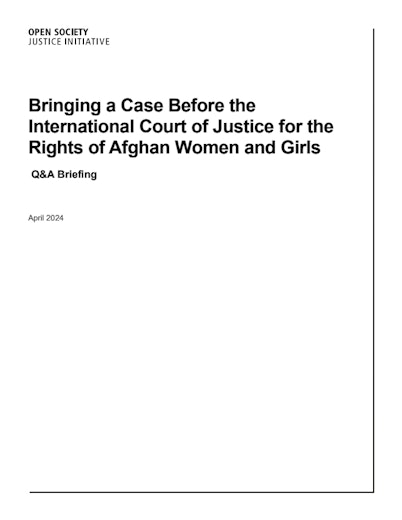ICJ Orders Russia to Cease Military Operations in Ukraine, Sending Strong Signal of International Condemnation
NEW YORK—The Open Society Justice Initiative has welcomed Wednesday’s ruling from the International Court of Justice (ICJ) ordering Russia to cease all military operations in Ukraine.
“The ICJ ruling represents a firm indictment of Russia’s invasion of Ukraine because it was delivered swiftly, is legally binding, and ordered Russia to immediately suspend military operations,” said James A. Goldston, executive director of the Justice Initiative. “While Russia is unlikely to comply, the ruling of the world’s most authoritative court makes clear that the invasion is illegal and serves to further isolate Russia diplomatically. It is a crucial sign of the international community’s solidarity with the Ukrainian people.”
Based in The Hague, the ICJ, sometimes referred to as the World Court, was established by the United Nations to rule on disputes between member states.
Ukraine filed its case at the ICJ shortly after Russia's invasion began on February 24, saying that Moscow's stated justification, that it was acting to prevent a genocide in eastern Ukraine, was unfounded. Thirteen of the court’s 15 judges ruled in favor of Ukraine, with judges from Russia and China voting against.
The ICJ ruling came amidst growing political momentum towards holding Russian forces responsible for war crimes committed during its campaign. For instance:
- The U.S. Senate, including all 50 Republicans, has urged the International Criminal Court (ICC)—just over a year ago the target of Trump Administration sanctions—to investigate Russia’s military for war crimes.
- Prosecutors in several countries have launched national investigations on grounds of territorial or universal jurisdiction.
- Leading figures have proposed the creation of a new international tribunal to bring Russia’s leaders to account for the crime of aggression.
Drawing on his extensive experience in international justice work, including at the ICC, with Syria prosecutions and with Cambodia’s Khmer Rouge trials, Goldston has identified three challenges ahead for international justice advocates: ensuring that legal justice remains a priority even if other priorities arise during peace negotiations; the need to sustain political will and financial support to bring cases to prosecutions and trial; and addressing concerns that other violations of international humanitarian law have not received the same concerted international legal response.
In addition to supporting the work of the ICC for over 20 years, as well as other international tribunals, the Justice Initiative has actively supported the prosecution of Syrian government officials in courts in western Europe through case building efforts, working closely with Syrian civil society groups.
Together with the rest of the Open Society Foundations, the Justice Initiative is now taking steps to support the documentation of alleged war crimes in Ukraine, while urging civilians to be protected in line with international humanitarian law.
Related Work
France Must Uphold Arrest Warrant for Syria's President al-Assad
The Open Society Justice Initiative has joined dozens of civil society groups in urging France to uphold an arrest warrant for Syria's President Bashar al-Assad for his use of banned chemical weapons.
Q&A: Bringing a Case Before the International Court of Justice for the Rights of Afghan Women and Girls
This paper considers 21 questions around the feasibility of bringing a complaint at the International Court of Justice against Afghanistan's Taliban for egregious and prevalent violations of women’s and girls’ rights.

A Podcast Gives Voice to Syrians Searching for Justice in Europe International Justice
Now in its second series, “The Syria Trials” tells the human stories behind the drive to prosecute al-Assad regime officials for atrocity crimes before European courts.
